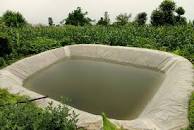Farmers Turn Plastic Waste Into Village Ponds
When People Unite to Make a Difference

A village in the Maharashtra state of India has started using plastic waste to make artificial ponds. Walni, is a rural village situated in Nagpur in a land that is famous for its oranges and agricultural produce. They came up with the concept of recycled plastic waste to manufacture water ponds to solve the water shortage crisis. These plastic sheets cover a dug-out landmass to can collect rainwater for harvesting.
Thinking Out Of The Box
Farmers saw the rainfall in the earth collected over time but did not retain the water. Although the entire village of Walni had approximately 30 nearby lakes and ponds the soil was so porous the water seeps into the soil. By the time summer comes around the water bodies would dry up.
So the villagers levelled the holes with soil then covered them with plastic made out of wrappers and polythene-based packs. They hand-sewed them to make huge sheets and lined them across the ponds then pressed them down with about a feet high layer of soil.
The experiment was done before the monsoon season, and they discovered that the sheets worked to prevent the water from seeping into the ground.
The Innovative Outcome
Water rained in March easily stayed past the two hottest months, April and May. Earlier without the plastic, the water in the ponds would dry up before December leaving the summer with a severe water scarcity problem.
This simple and yet super effective solution resolved two major issues: recycling plastic waste and preventing shortage in the water supply. After the farmers noticed the positive outcomes, they applied the plastic lining to all the other ponds around the village.
The Times of India quotes a villager as saying, “Every Sunday we collect the plastic and hand it over to the women to make big sheets by stitching them together.”
From Burning Plastic To Plastic Ponds
Before coming up with the solution to the water crisis, the entire village would burn the plastic waste, filling the environment with toxic fumes, causing untold disease to the villagers.
The new water solution transformed the village not only with access to drinking water, but also with water for washing, clothes, utensils, and their gardens. The experiment showed how sometimes the simplest of solutions offer the biggest of rewards.
Learn more about Plastic Waste Ponds and get involved.